Iranian Government To Prioritize Food Security Amid Currency Depreciation
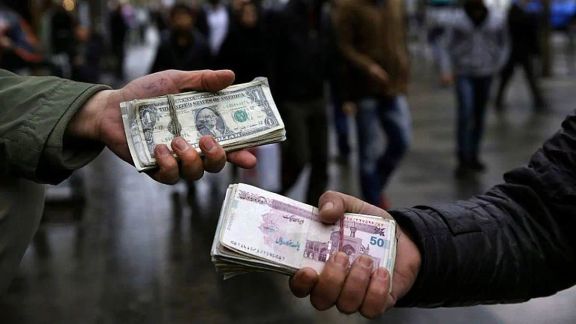
Iran's First Vice President Mohammad Mokhber says the government is committed to addressing the issue of food security amidst the nation's economic challenges.

Iran's First Vice President Mohammad Mokhber says the government is committed to addressing the issue of food security amidst the nation's economic challenges.
"One of the main concerns of the government since the removal of preferential exchange rate currency has been focusing on the people's food basket to exert less pressure on them, especially the lower decile of society," he said.
"The government has tried to adequately supply the people's essential food basket," he added.
The official exchange rate of the Iranian rial, subsidized by the state, stands at 285,000 rials per US dollar, significantly lower than the open market rate. The official rate is exclusively utilized for importing essential goods, aiming to shield Iranian consumers from sudden and dramatic price increases due to sanctions.
Mokhber's remarks come in the wake of Iran's currency hitting a historic low of 613,500 rials to the dollar, coinciding with celebrations for the Persian New Year. The sharp depreciation has sparked concerns among citizens, leading many to seek refuge in foreign currencies to safeguard their savings and investments.
However, skepticism persists among Iranians regarding the government's mishandling of economic policies. Masoud Pezeshkian, a parliamentarian, criticized the failure to fulfill promises of curbing inflation, which continues to plague the populace.
"It was planned for inflation to first halve and then become single-digit, but not only did it not halve, it has increased several hundred times." He added, "People are living with difficulty, and we have not acted on the slogans we raised about justice."
Iran's economy has grappled with persistent inflation exacerbated by international sanctions and domestic economic mismanagement. Sanctions have constrained Iran's access to global markets, leading to shortages of essential goods and currency devaluation.

The serious corruption allegations against Ayatollah Kazem Sedighi, the ultra-hardliner Friday imam of Tehran, have further eroded trust in the Iranian system and its officials among the populace.
Earlier this month, irrefutable evidence surfaced indicating Sedighi's involvement in the appropriation of a valuable plot of land worth approximately $20 million in northern Tehran. The revelation, brought forth by a whistle-blower, shed light on Sedighi's alleged misdeeds.
Initially, Sedighi denied any knowledge of the transfer of ownership, claiming his signature had been forged by a trustee. However, it was later revealed that Sedighi had personally signed the transfer documents at a notary public. Despite this acknowledgment, the seminary he oversees maintained innocence and stated that the plot's ownership was in the process of being returned.
“Claiming [the plot] is in the process of being repatriated [to the seminary], several months after the crime was committed and following its revelation, has no effect on the [nature of the] crime itself,” Mohsen Borhani, a dissident lawyer with seminary training, said on Instagram, arguing that repatriation of the plot, if completed, can only be a factor contributing to reduction of the prescribed sentence for the crime.
Iran International TV’s “Your Side of the Story” program received dozens of messages last week from citizens who are extremely distrustful of a regime they say is “systematically corrupt” and incorrigible.
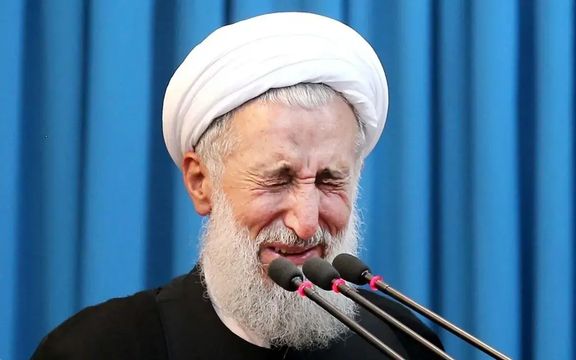
Some of the messages shared the same suspicions that repatriation of the appropriated plot to the Seminary by Sedighi, even if true, meant nothing other than “taking from one pocket and shoving it in the other”.
Many others who have taken to social media to express their anger, compare authorities’ leniency in dealing with Sedighi’s “grand theft” with their extreme harshness against others for petty theft.
People commented that the system punishes petty criminals for theft by long prison sentences and even amputation of fingers and hands, targets women for showing a few strands of hair, but has not taken any action against Sedighi as if repatriation of the ownership of the plot to the seminary all wrongdoing is forgiven.
“Firstly, there is no documentation or evidence that this man repatriated the plot. Even if he produces proof, no one will believe it because Iranian people’s trust in the authorities of the Islamic Republic does not even reach one percent,” one of the messages sent to Your Side of the Story read.
A veteran of the Iran-Iraq War (1980-1988), Khalil Aghapour, in a tweet recounted how as a 15-year-old he had forged his father’s signature to be able to join the volunteers to defend the homeland against the Iraqi invasion, and was mortally wounded several times. “I wish I was dead,” he said, referring to the deeds of those in power who he said claim to be pious.
Sedighi is among Supreme Leader Ali Khamenei’s inner circle. Despite the scandal involving him, he was invited to Khamenei’s Norouz (New Iranian Year) speech on March 20.
Hardline media such as Tehran Municipality’s Hamshahri newspaper and Fars News Agency, have been sympathetic to Sedighi and tried to justify his actions.
Dedicating a large section on its front page to the issue on Saturday, Hamshahri called on hardline students known as Justice Seekers (Edalatkhahan) who are highly critical of Sedighi to treat the case “piously” and to “avoid gross injustice in the name of seeking justice”.
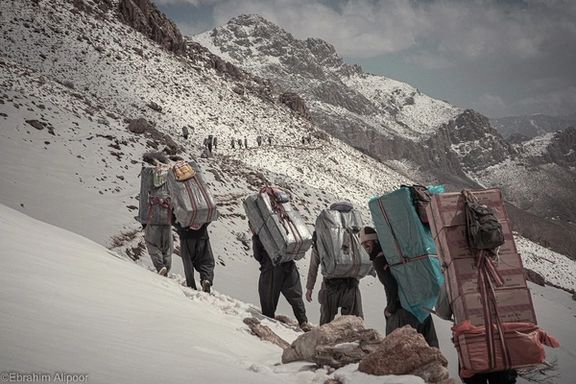
In the last Iranian year, 44 kolbars have lost their lives with 400 more sustained serious injuries as they work on the Iran-Iraq border, a 90 percent year on year rise.
The Kurdish workers are used to transport goods across the mountainous border, most of whom live below the poverty line, in the direct line of fire on the treacherous border zone.
The Kolbars regularly face direct shootings by Iran's military forces, landmine explosions, harsh weather conditions, fatal falls from heights, and drowning incidents.
Of the injured kolbars, 337 suffered wounds from direct shootings by the military forces of the Islamic Republic, while two were injured by Iraqi military gunfire. Kolbar News reveals that 37 of the victims were under the age of 18, classified as minors.
The statistics center of Kurdpa Human Rights Organization documented that from 2012 to 2023, at least 2,206 kolbars were either killed or injured. Out of those, 589 lost their lives, and 1,617 sustained injuries.
Kolbar News last year reported that in the first half of 2023 alone, 61 Kolbars lost their lives in border areas and inter-road routes of West Azarbaijan, Kordestan, and Kermanshah provinces.
Human rights organizations, along with some members of parliament, have consistently emphasized that Kurdish citizens in the western regions of Iran resort to the job as a means of survival amidst rampant poverty.
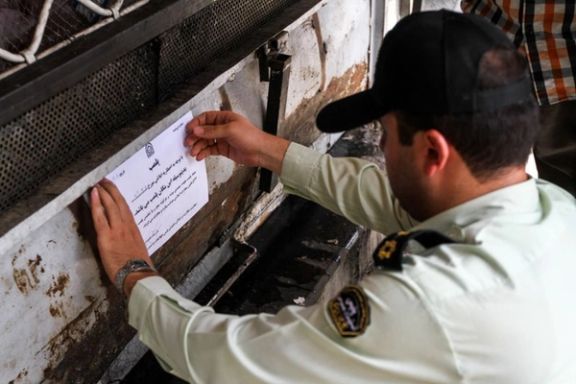
Authorities of the Islamic Republic have sealed over a hundred shops across various cities including after being accused of disrespecting the month of Ramadan.
Iranians are required to refrain from eating, drinking, and smoking in public during Ramadan, even if inside their vehicles. Article 638 of Iran's Islamic Penal Code, implemented about 12 years after the 1979 Islamic Revolution, mandates penalties ranging from 10 to 60 days imprisonment or up to 74 lashes for violating fasting regulations, applicable to all regardless of religion.
The Prosecutor of Hamedan, Hassan Khanjani, announced the sealing of 65 businesses along with a food court for “non-compliance with Ramadan regulations” on Saturday.
In a similar vein, the police commander of Rey said that "24 defiant businesses and violators of the Ramadan regulations have been sealed off as part of the supervision plan on establishments during Ramadan." Additionally, he added that 73 other businesses have been warned of closure.
The crackdown follows Iranian media reports in mid-March detailing the sealing of four restaurants in Abhar, Zanjan province, and 10 businesses in Dezful, Khuzestan province, forfailing to observe strict Ramadan mandatory regulations.
Officials of the Islamic Republic issue warnings annually during Ramadan, emphasizing the importance of fasting. On March 20, Deputy Interior Minister for SecurityAffairsMajid Mirahmadi cautioned against "public fast-breaking" by Norouz travelers, citing Article 638 of the Islamic Penal Code, which deems eating in public a punishable offense.
Mirahmadi reiterated the prohibition on operating businesses such as restaurants, cafes, teahouses, and food vendors within cities before sunset.
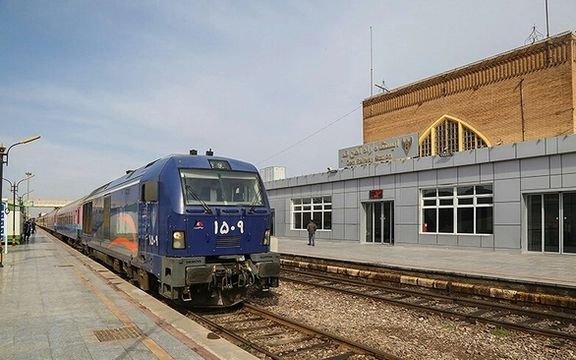
Hacker group APT Iran has infiltrated the cyber infrastructure of Iran's Railway Company in the latest such attack on government networks, with documents revealing mandates for female employees to wear Islamic attire.
The Cyberban News Agency confirmed the hack from the anti-government group though the agency downplayed the extent of the breach, dismissing reports of an attack on the main railway infrastructure as propaganda.
APT Iran claimed the breach aimed to alert railway officials about security lapses after previous breaches of the IranCell Communication Services Company and State Organization for Registration of Deeds and Properties.
Among the leaked documents is a directive signed by Mohsen Tabatabaei Atabak, the Director General of Planning and Monitoring of Passenger Services, outlining guidelines for employee conduct, including adherence to mandatory hijab for female staff.
The guidelines specify attire requirements, emphasizing "loose and long garments made of thick fabrics" and complete hair coverage.
The hackers also exposed identity documents, internal reports, and wagon maps.
The incident is the latest in a series of cyber-attacks targeting Iran's government institutions, including its Railway Company. In July 2021, the hacker group Gonjeshk-e-Darande disrupted railway operations by infiltrating the Ministry of Roads and Urban Development and forcing a switch to manual train management.
Last month, the hacktivist group Edalat-e Ali disclosed a major breach in the servers of the Iranian judiciary, boasting access to a vast repository comprising millions of files and a treasure trove of confidential documents.
Cyber expert Amin Sabeti recently told Iran International that hacks on government facilities are likely to continue amid the ongoing unrest. Last month, a major hack of the parliament’s servers brought to light troves of documents, including the income of lawmakers and US sanctions evasions.
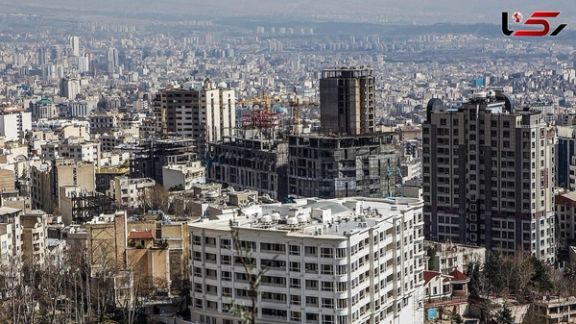
Real estate experts anticipate a significant rise in housing prices in Iran due to factors such as further depreciation of the national currency, but they also foresee continued stagnation in the market.
Sellers refuse to lower prices as the national currency loses value, and inflation drives rents higher, putting further pressure on tens of millions of people.
Iran's housing market has experienced stagflation over the past two years due to various factors, including high inflation of at least 40 percent, which has substantially increased construction costs. Additionally, repeated turbulence in the foreign currency market, a notable decrease in liquidity available to developers, and political uncertainties have all contributed to the market's challenges.
Even before Norouz (March 20), typically a period of high property sales, Iran's housing market remained stagnant. Factors such as the fasting month of Ramadan, traditionally a quiet period for most markets, and exorbitant prices beyond the reach of many wage-earners have contributed to this situation.
Experts do not anticipate a significant uptick in the housing market's activity even after Ramadan, even if economic indicators such as the monthly inflation rate, typically announced by the central bank in late April, show improvement.
The rial has fallen more than 20 percent since January and now stands at more than 610,000 against the US dollar. Fearing further depreciations in the new calendar year, many rush to buy foreign currencies to protect their cash and investments. Real estate and homes are the most important savings for the middle class and people are reluctant to sell for worthless rials. Sellers calculate the price of their real estate in dollars when they set a price.
The figures released by the Statistics Center of Iran in February indicated an annual inflation rate of nearly 40 percent in the housing market in the preceding twelve months.
The average cost of one square meter of apartments in Tehran and most other major cities is currently above 700 million rials (over $1150) whereas the average monthly earnings of civil servants barely exceed $200 after taxes and other deductions. Ordinary workers earn less than $200 a month.
Unaffordability of properties for sale is a major factor in driving rents up in the capital and other major cities where the cost constitutes around half of the consumer living cost.
Similar to populist promises made by former President Mahmoud Ahmadinejad, President Ebrahim Raisi pledged during his 2021 presidential campaign to address Iran's housing crisis by constructing one million affordable apartments annually. So far there is no sign of any new housing having even started.
The ambitious Mehr Housing scheme launched by Ahmadinejad during his tenure, from 2005 to 2013, also aimed at building over 4 million housing units. The project was never completed and the apartments that were eventually delivered to some of the buyers lacked amenities. This was during time period when Iran was earning more than $100 billion a year from oil exports and the government was awash with cash. Now, amid US sanctions, and lower prices, Iran earns a fraction of that income.
Architect and university professor Beytollah Sadeghi, a vocal critic of excessive government interference in housing projects, emphasized that constructing one million residential units constitutes approximately 4% of all urban development. He underscored the need for double-digit economic growth to support such a massive undertaking.
Sadeghi questioned why Iran's private sector struggles to achieve similar feats compared to neighboring countries, which not only thrive but also create markets for others. He raised concerns about potential obstacles hindering Iran's private sector, such as lack of resources or expertise.